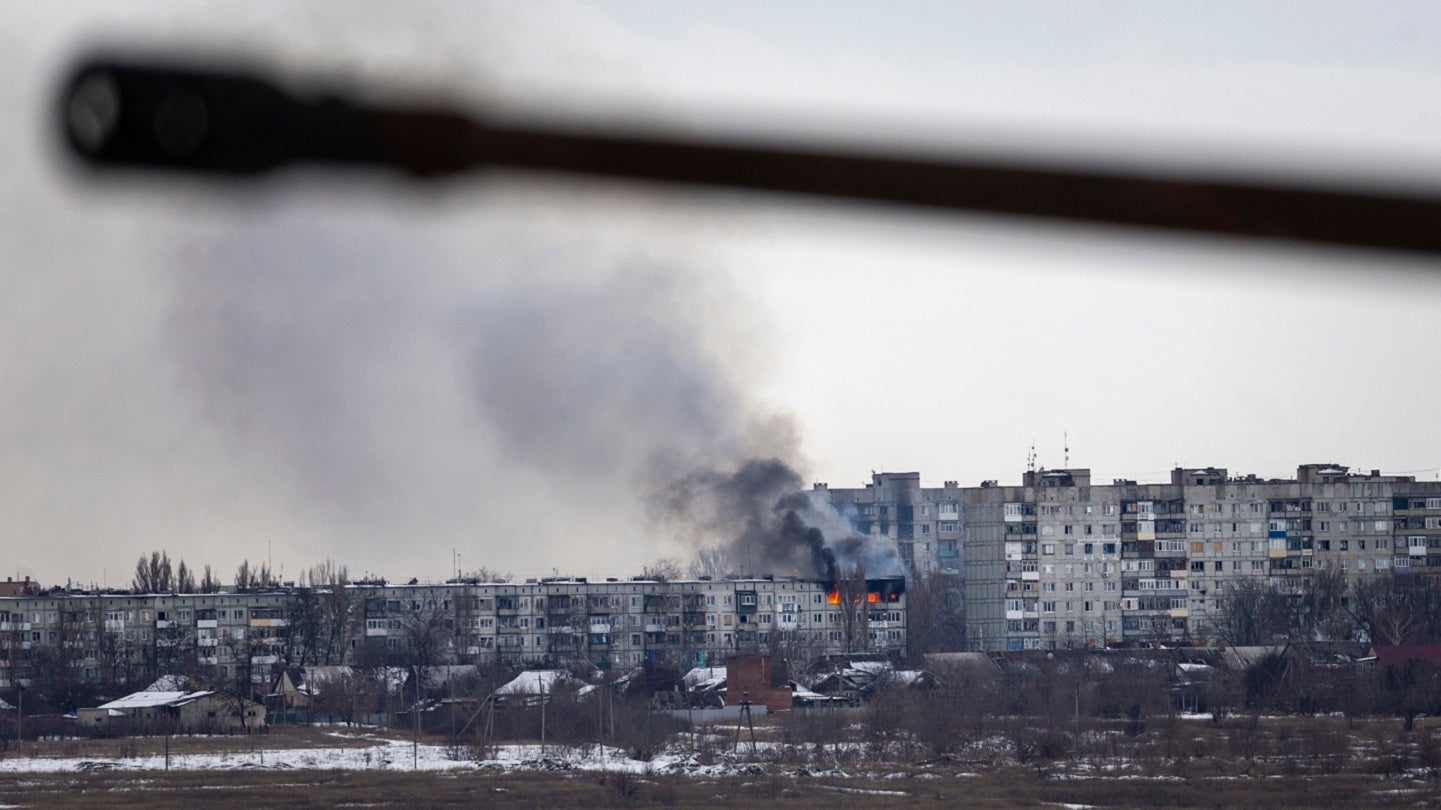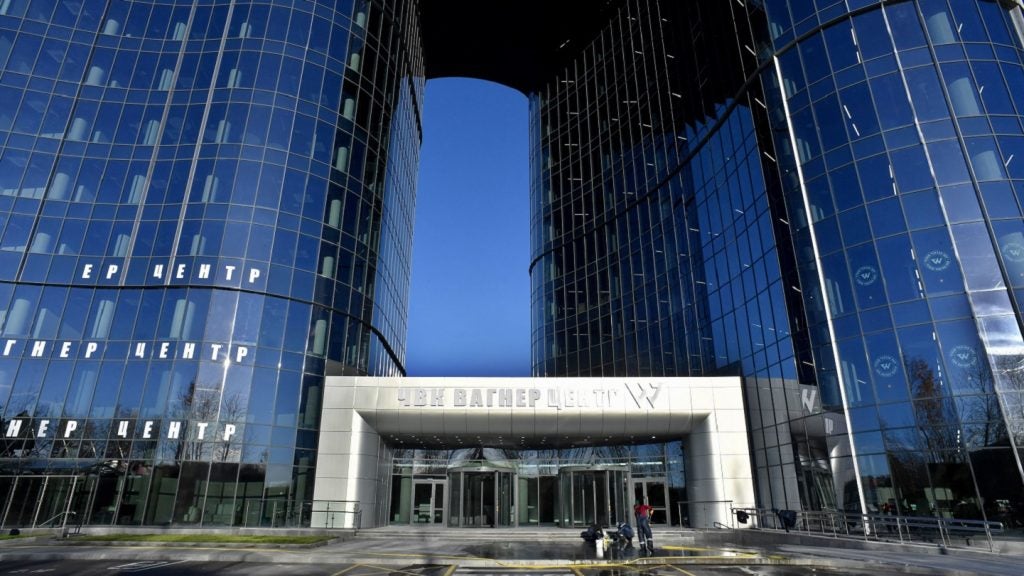
The emergence of Russia’s Wagner mercenary group from its traditional grey zone of operations in client states to the frontlines of Moscow’s war in Ukraine could hinder the company’s growth prospects, as its cloak of deniability is thrown aside to lay bare its ties with the Putin regime.
Following institutional-level failures by Russia’s military in its botched efforts in Ukraine, Russian President Vladimir Putin turned to the Wagner group as an alternative force to field in the war, operating somewhat detached from the traditional command and control structures. The exact size of the force being wielded in Ukraine is unclear, but it is likely to be in the tens of thousands, a figure augmented through the penal recruitment drive in late-2022.
Wagner forces are currently being utilised in the Bakhmut offensive, as Russia attempts to take this strategic, and symbolic, town from Ukrainian defenders. However, Wagner’s presence and actions on the frontlines could change how the group is perceived globally, and make it less able to argue against it being considered an asset of the Russian state.
States that engage with Wagner know they are engaging with Putin’s regime in a way that was not the case prior to Russia’s invasion of Ukraine
Leo Docherty, Parliamentary Undersecretary of State at the Foreign, Commonwealth and Development Office
Speaking on the Wagner group before the UK parliamentary defence committee on 6 February, Leo Docherty, Parliamentary Undersecretary of State at the Foreign, Commonwealth and Development Office (FCDO), and Ben Fender, director of Eastern Europe and Central Asia at the FCDO, said that the erosion of Wagner’s deniability could work against it in other areas of world where it operates or is looking to gain influence.
Giving evidence, Docherty said that Wagner’s business model had been “much diminished over the past year”, and had impacted its ability to claim deniability, a trait it used to such effect in countries like Libya.
“They can no longer enjoy the grey zone they had prior to Ukraine. Now it is clear they are deployed as a proxy force and [Wagner founder Yevgeny] Prigozhin is running them, that was not the case before. Before, part of their unique characteristic there was a deniability,” Docherty said.
“States that engage with Wagner know they are engaging with Putin’s regime in a way that was not the case prior to Russia’s invasion of Ukraine,” he added.
According to Fender, the FCDO was “doing more” in terms of actions to monitor and information gather about Wagner and its assets than was the case “six months ago”, including holding a recent conversation at the G7 group of nations level on possible sanctions.
“We have done steps in recent years to sanction Prigozhin, the Wagner group, [and] we are progressively taking the steps we can. We are concerned given the scale of Wagner’s activities in Ukraine that the organisation and its networks are globally becoming a bit more powerful, and we are stepping up what we are doing on this,” stated Fender.
According to the defence committee, the UK has sanctioned only around 20% of the volume of Russian individuals and enterprises that the US has in relation to the Ukraine war. Fender said he was not aware whether Wagner had any assets in the UK that could be frozen due to the group’s actions in the conflict.

New UK sanctions
On 8 February, the UK announced new sanctions targeting Russian defence industrial capability and financial networks, including towards specific individuals. In total the new UK package hit six entities providing military equipment such as drones for Russia’s invasion of Ukraine, as well as eight individuals and one entity connected to financial networks that help maintain wealth and power amongst Kremlin elites.
Organisations and companies targeted included drone manufacturer CST, rotary aerospace manufacturer RT-Komplekt, military logistics company Oboronlogistics, tracked vehicle chassis OEMs Universalmash and Lipetsk, as well as software company Topaz, which is involved in military aviation.
In addition, IT services company Moscoms has been sanctioned, with the FCDO stating that the company acts as a nexus for the Russian elite, providing host domains to those involved in destabilising Ukraine. This includes LLCinvest.ru, which is connected to 86 companies within Putin’s network that are worth a total of £3.7bn.
The ‘LLCInvest’ domain is also used by the organisation that owns the Shellest, a yacht linked to Putin and used regularly for travel to his palace, according to the FCDO.
Targeted individuals include Boris Titov, presidential commissioner for entrepreneur’s rights with ties to palaces and properties used by Putin; Nikolay Egorov, who was until recently deputy chairman of the largest privately owned oil refinery in Russia; Sergey Rudnov, owner of pro-Kremlin news outlet Regum; Svetlana Krivonogikh, a shareholder in Bank Rossiya and the National Media Group, which promotes the Russian invasion of Ukraine; and Viktor Myachin, owner of Aerostart, a Russian aircraft maintenance and repair company.
Other individuals sanctioned were Alexey Repik, chairman of the board of Russian pharmaceutical company R-Pharm and who is claimed to have ties to Putin; Evgeny Shkolov, a former presidential aide and deputy chairman of the board of directors for JSC System Operator of the Unified Energy System; and Pavel Titov, president of Delovaya Rossiya, an association that represents entrepreneurial interests set up by his father Boris Titov.
The FCDO states that the UK has sanctioned over 1,300 individuals and entities since Putin began his full-scale invasion, with over £20bnof trade in goods is now under full or partial sanction. The FCDO also claimed that Russian exports of machinery and transport equipment have decreased by 98%, forcing Russia to “desperately scrounge sub-par semiconductors from fridges and dishwashers to build military equipment”.
Information warfare operations
Another tactic utilised by Russia is its use of information operations, effectively non-kinetic efforts to shape the narrative around the war in Ukraine, using a range of assets and means. Russia’s success or otherwise in this area has been mixed, according to western officials, with a significant percentage of such action aimed at ‘security regime security’ inside Russia.
Aspirations to effect public opinion in western or NATO countries about supporting Ukraine have largely been unsuccessful, western officials stated, with strong majorities in countries such as the UK (~80%), Poland (~83%) holding the opinion that Russia has no justification for its invasion. Other countries, such as France (~68%), also stand broadly against Russia, although with slightly lower majorities.
There is little independent verification available to determine how effective Russian disinformation efforts have been in shaping the narratives in western or NATO countries.
While such operations would usually take placed through pro-Russia news sites or blogs, other state-supported agents of influence, including journalists and representatives from the business and academic sectors, are also thought to be being utilised from within European borders.
International media reports recently unveiled that Wagner’s Prigozhin was also behind the formation of a cyber troll farm that has been sanctioned for meddling in US elections.
Telegram is also widely used Russia to conduct information warfare operations, with more than 1,500 channels links to informal and formal networks in support of Moscow’s aims in Ukraine, as well as the use of sock puppet accounts and doppleganger news sites. Such cyber operations are widely countered in Europe and the US, although the spreading of pro-Russia narratives gains better traction in countries such as Kenya, Brazil, and South Africa, western officials stated, with a mixed picture in other countries like India (which has significant business and military ties with Russia), Malaysia, and Indonesia.



